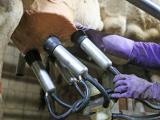Aug 17, 2010
Diarrhea common, cholera feared in flooded areas of Pakistan
In areas of Pakistan hit by recent massive floods, rumors of cholera cases are plentiful and diarrheal diseases are on the rise, the World Health Organization said in an Aug 15 statement. More than 14 million people have been affected by the floods, the agency said. It said the leading illnesses among the flood victims are skin diseases, acute watery diarrhea, and acute respiratory infections. With rumors of cholera "pouring in," the WHO has asked the Pakistani health ministry to check out news reports of cholera in Mingora in the Swat district and to clarify whether a cholera risk assessment has been carried out. Cholera is endemic in Pakistan, and sporadic cases among the flood-affected population are expected, the agency said. In one province, Khyber Pakhtunkhwa, daily disease surveillance data for Aug 11 showed that acute diarrhea accounted for 3,807 (17%) of 21,813 medical visits in eight flooded districts, making it the leading cause of morbidity. Acute diarrhea was reported as a common problem in Punjab and Baluchistan provinces as well.
Aug 15 WHO statement
Measles deaths rising in Africa
Increasing measles cases and deaths in Africa are stoking fears that the public and health officials have become complacent after recent successes in reducing some of the disease burden, Reuters reported today. United Nations officials said outbreaks in Africa have led to more than 1,400 deaths this year so far, mainly in young children. According to the World Health Organization, 28 African countries have reported measles outbreaks this year. The increase in disease activity could reverse a dramatic drop in measles deaths from 2007 through 2008. Officials also fear that gaps in political and financial commitment to measles prevention may also reverse some of the progress that has been made.
Aug 17 Reuters story
Vietnam updates H5N1 outbreak reports
In an update today to the World Organization for Animal Health (OIE), Vietnam reported six H5N1 avian influenza outbreaks that were detected between early May and mid July. Two were in Thai Nguyen province in the northern part of the country and two were in Dak Lak province in central Vietnam. Quang Nam and Gia Lai provinces also reported outbreaks. Few details were provided about the type of poultry that were affected. One of the outbreaks in Thai Nguyen involved an unvaccinated duck flock. Among the six outbreaks, 6,057 birds died and 4,923 more were culled to control the virus. Epidemiologic investigations revealed that the source of the outbreaks included the introduction of new birds to flocks, illegal movement of animals, and fomites such as vehicles or animal feed. Vietnam is among a handful of countries where the H5N1 virus is endemic in poultry.
Aug 17 OIE report
US pledges $26 million to help FAO fight avian flu
The United States has renewed its support for the United Nations Food and Agriculture Organization's (FAO's) efforts to stop H5N1 avian influenza and other emerging disease threats, pledging $26.3 million for the period from October 2011 through September 2012, the FAO announced today. The funds from the US Agency for International Development (USAID) will be used to support FAO technical assistance for surveillance and outbreak response capacities in countries where H5N1 persists, including Bangladesh, China, Egypt, Indonesia, and Vietnam, the FAO said. The money will also be used to strengthen veterinary lab, animal surveillance, and response capacities for other emerging disease threats in "hot spot" regions. Juan Lubroth, the FAO's chief veterinary officer, said the FAO-USAID partnership has been at the forefront of efforts to prevent and control H5N1 and other animal disease threats. He said the USAID has contributed $132.5 million to the effort since 2005, benefiting more than 90 countries.
Aug 17 FAO announcement
Scientists seek test for determining if pathogens are lab-grown
Scientists at Rice University in Houston have won a Department of Defense grant to develop a test to tell whether a pathogen causing a disease outbreak is natural or was grown in a lab by terrorists, according to a university press release. The 3-year grant, awarded by the Defense Threat Reduction Agency, is worth $800,000, said Jade Boyd, a university spokesperson. The goal of the project is to find signs that an organism has become accustomed to living in a biology lab, the university said. Yousif Shamoo, director of Rice's Institute for Biosciences and Bioengineering, said bacteria can progress through hundreds of generations in a few weeks and quickly adapt to new conditions, giving telltale signs of their domestication in a lab. "Our expectation is that organisms will lose certain genes that allow them to get nutrition from the soil or the gut or wherever they came from, simply because they won't need them anymore," he said in the press release. He and his students plan to gather wild strains of Enterococcus faecalis and Escherichia coli and grow them in their lab; they will take "genomic snapshots" of them as they evolve and analyze them for patterns. The hope is that the project will generate information that will help public health officials quickly determine how to respond to disease outbreaks, according to the release.
Aug 16 Rice University release




















